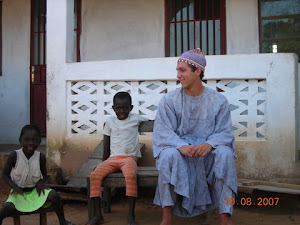The area between the villages has mostly short dry grasses so fires burn easily. In between the three nearby villages there are nothing but fields; by the way, I can see those villages at the distance from my village .
After breakfast, I started to make/fix the fence around my garden with the help of Mamadou, my counterpart in The Gambia. After 15 minutes or so, we saw smoke rising in the distance halfway between my village and the next; the villages are about 2km apart. My father and some of my host brothers took off, machete and rake in hand. Soon afterwards we saw the smoke greatly increased; thus my counterpart and I also took off toward the fire. When I got close I was very surprised. Boys and men were swinging branches with leaves to put out the fire. I could not believe they actually thought they could put out the fire with just leafy branches. Sure enough the wind picked up and the men realized they were no match for the fire.
We all headed back to the village and started to clear a firebreak of 2 meters around the village. I was trying to figure out how they were going to put the fire out. I thought maybe they would just let the fire die out on its own. However, by this point the fire was growing towards another village to the west of my village. I started to tell my counterpart we should widen the firebreak, but my counterpart told me to relax, that the fire would be taken care of. All of a sudden, boys in their late teens and twenties started to show up from everywhere carrying leafy branches. They took off toward the fire and started beating the flames and running along the fire line. Women started carrying water out to the fields, but instead of using the water on the fire, the men drank it.
I stood there not knowing what to do because I did not think they could do it; however, with help from all four villages, they succeeded in putting out the flames. Soon afterward everyone went home. Apparently fires happen every year so they are experts at putting them out. Last year was a rare event since there were no fires. I still find it amazing how the villagers put out the fire using only branches, but I guess that is what they have. There is no running water or fire service so they make do with what they have.




 My host family separating the peanuts from the dried groundnut plant
My host family separating the peanuts from the dried groundnut plant


